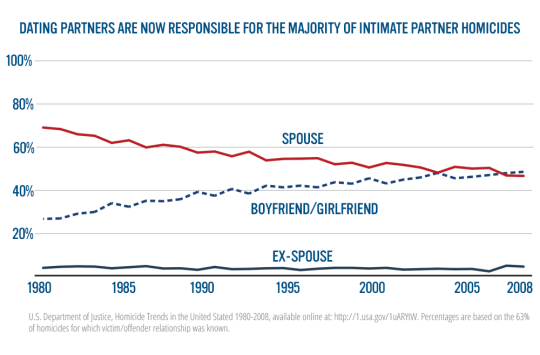When It Comes To Domestic Violence, Boyfriends and Girlfriends Can Be More Deadly Than Spouses

Abuse perpetrators who are not married, living with, or have a child with their victim are not banned from legally purchasing a gun. (Getty Images)
“When I was growing up, domestic violence was often considered a private matter, kept in the shadows and behind closed doors,” Valerie Jarrett, a Senior Advisor to President Obama and the Chair of the White House Council on Women and Girls, writes in this week’s Lenny Letter about the on-going problem – and role – guns play in instances of domestic violence.
The 1968 Gun Control Act prohibits “anyone convicted of a felony and anyone subject to a domestic violence protective order from possessing a firearm.” And yet, several major problematic loopholes exist that fail to keep guns out of those with a record of domestic violence.
Related: SAFE Act Introduced to Protect Domestic Violence
One loophole has to do with unregulated online firearms sales; buying from an unlicensed seller online allows those who know they would not be otherwise able to purchase a gun to do without a background check.
Another major issue when it comes to guns and domestic violence is what are known as the “boyfriend/girlfriend loophole” and “stalker loophole.” Abuse perpetrators who are not married, living with, or have a child with their victim are not banned from legally purchasing a gun. Neither are those with a misdemeanor stalking conviction. Worst of all is that no bans apply to situations where a temporary restraining order are in place against an abuser – in other words, what is oftentimes a victim’s first line of defense against their assailant is ineffective at preventing that same assailant from acquiring a firearm.
Related: The Number of Male Domestic Abuse Victims Is Shockingly High — So Why Don’t We Hear About Them?
Everytown for Gun Safety reports that more women in the United States are killed by their dating partners than their spouses and that 25 percent of perpetrators that targeted an intimate partner were not married to and did not share a child with their victim and that one in four mass shootings between 2009 and 2014 involved a shooter killing a current or former intimate partner to whom the shooter had never been married or shared a child.

Furthermore, 35 states do not prohibit all people convicted of misdemeanor domestic violence crimes and all people subject to restraining orders from buying or using guns and all but 16 states require background checks on all handgun sales, regardless of whether or not a gun is purchased from a licensed or unlicensed dealer in person, online or at a gun show. Additionally, many perpetrators of domestic violence have not been convicted of a felony or misdemeanor, and thus are free to legally purchase firearms.
And so – a boyfriend or girlfriend convicted of a misdemeanor for assaulting their dating partner is free to pass a background check and legally fully able to buy a gun as long as the two aren’t married or co-parents.
“Federal law doesn’t keep guns out of the hands of dating partners or stalkers,” reiterated Erika Soto Lam, Communications Director for Everytown for Gun Safety, “A lot of women are at risk when dating partners are not a part of the laws that protect women – and this is something single women should be aware of.”
Related: 5 Ways Your Relationship Can Be Toxic to Your Health
Sen. Amy Klobuchar (D-Minn) has proposed a legislative measure to address this, a bill that would close these loopholes; this fall, Sen. Mark Kirk (R-Ill.) signed on as co-sponsor. As the Washington Post reports, the National Rifle Association (NRA) opposes this bill. In a statement, the NRA has said that the Klobuchar-Dingall would “turn disputes between family members and social acquaintances into lifetime firearm prohibitions” and “manipulates emotionally compelling issues such as ‘domestic violence’ and ‘stalking’ simply to cast as wide a net as possible for federal firearm prohibitions.”
As Soto Lamb explains, the Klobuchar bill would apply the same definition for dating partners as exists in the Violence Against Women Act (VAWA), that of “someone who has been in a romantic, intimate relationship.”
Much of the problem with the boyfriend/girlfriend loophole is that “the law hasn’t caught up with relationships today,” Soto Lamb says. “The laws that were written long ago when marriage rates were different, when relationships were different, were not devised to protect women who are not married and may not ever get married – but deserve the same protections under the law.”
Furthermore, says Soto Lamb, there is a pressing need to educate all Americans, and young women in particular, about “how gun laws have not caught up with their lives.”
“It can effect any kind of relationship,” Soto Lamb says of domestic violence. “This also comes up when we talk about campus sexual assault and the gun lobby. The gun lobby uses this issue to make a case for why women should arm themselves. And I think this comes from a very old-school perception that sexual assault is happening with a rapist coming out of the bushes when a woman is walking across campus late at night.”
Data, however, tells a different story.
“The research shows us that rape is happening within relationships – and when a gun wouldn’t necessarily help in those situations. [The current laws reflect] an outdated perception of women. Part of our job is to ultimately improve and change laws to protect women and make sure all of us are on the same page regarding how women are effected by gun violence,” says Soto Lamb.
And Jarrett’s essay in Lenny explains, she says, that “[y]ou don’t have to be courageous to stand up and say that we need to make American safe again.”
Let’s keep in touch! Follow Yahoo Health on Facebook, Twitter, Instagram, and Pinterest.
